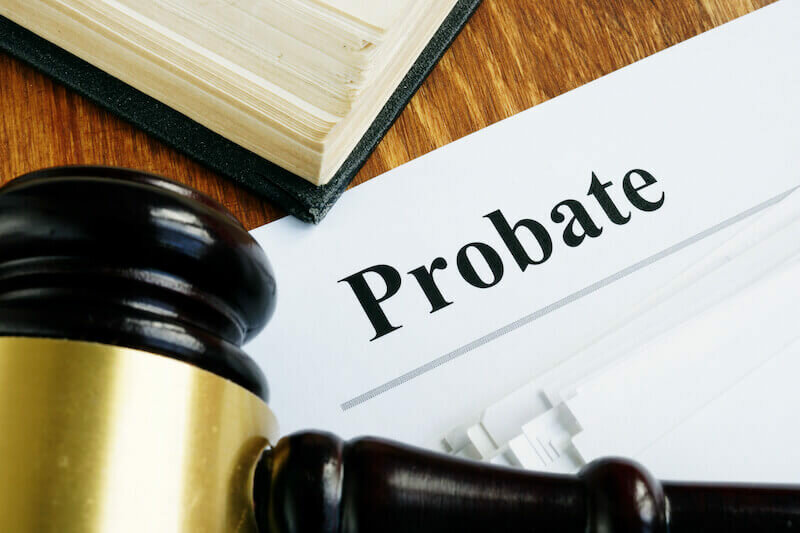Have you just inherited a house in Utah and don’t know what your next steps should be? For a lot of people dealing with a death in the family can be a sad time. Adding what legal actions you need to take can make it a confusing time too. If a Will is left, at least, that will help name the heir, but if there isn’t a will, the courts will have to determine who should be named executor of the estate. Selling the inherited house will bring another dynamic to the picture. To help you handle this particular situation, this guide will cover the probate process in Utah and how to sell an inherited house; that way, you know what your next step should be.
Guide to Selling an Inherited House In Utah

What is Probate?
Probate is the official way an estate gets distributed to heirs and designated beneficiaries under the court’s supervision. The heir is usually a surviving spouse or an adult child nominated by the deceased person’s Will or is appointed by the court if there is no Will. Once established, this person, called an executor or Personal Representative, has the legal authority to gather and value the estate’s assets, pay bills and taxes, and, ultimately, distribute the assets to the heirs or beneficiaries. The house you inherit would go through probate unless the estate were set up to avoid Utah probate.
When is Probate Required?
A little bit of good news, not all estates must go through probate in Utah. If a deceased had created a Living Trust to hold his or her largest assets, then the estate won’t go through probate unless the assets left outside of the trust add up to more than Utah’s small estate limit (less than $100,000). Usually, that is why a Living Trust was created to avoid probate after the trust’s Grantor’s death.
But for estates in Utah that surpass the small estate’s threshold of $100,000, and if there is either no Will or a Will (but not a Living Trust), probate will be necessary before an estate can be transferred to the deceased’s beneficiaries or heirs.
The general system required to settle an estate in probate is set out in Utah laws called the Uniform Probate Code. Under the Uniform Probate Code, there are three types of probate proceedings: informal, unsupervised, and supervised formal.
Informal Probate
Most probate proceedings in Utah are informal. This form of probate is used when the heirs and beneficiaries get along, there are no debts to resolve, and you don’t anticipate any trouble.
The informal process begins when you file a request to the probate court to serve as the “personal representative” of the estate. Once your application is approved, you have the legal authority to act for the estate. Usually, you will get what’s called “Letters Testamentary” from the Utah court.
Once you get the letters, these are typically the next steps:
- Send out a formal notice to beneficiaries, heirs and creditors that you know of
- Publish a notice in a local newspaper to alert other creditors
- Provide proof that you’ve mailed notices and published the notice
- Prepare an inventory and appraisal of the estate’s assets.
- Keep all the property safe and maintained.
- Distribute the property (when the estate closes).
Once the estate has been distributed, you close an informal proceeding by filing a “final accounting” with the Utah court and a “closing statement” stating you’ve paid all the debts and taxes, distributed the property, and filed the accounting.
Unsupervised Formal Probate
Formal probate, even an unsupervised one, is still a court proceeding. That means that a judge must approve certain steps taken by the personal representative, such as selling estate property, distributing assets, or paying attorney fees. The reason for involving a Utah judge is to settle disputes between beneficiaries over the distribution of assets, the Will’s meaning, or the amounts due to creditors. The informal probate process won’t work if there are disputes, so that’s when the court gets involved.
Supervised Formal Probate
Supervised formal probate is when the Utah court steps in to supervise the whole probate process. The Utah court must approve the distribution of all property in such a proceeding.
Can You Sell The Property While In Probate In Utah?
The short answer is yes, you can. If probate is required, there are two options for selling the home. You can sell it while still in probate. Or you can sell the property after it goes through probate—after you become the legal owner.
To sell a house in probate, you will have to be named executor or an administrator. If the deceased appointed no one in the Will, the court would appoint the closest relative as executor. But until that happens you cannot sell the inherited house until you specifically are named executor. Once probate is granted and the executor (you) are appointed by the court then you can proceed with selling an inherited house in Utah.
If there is a Will, usually what you can and can’t do as the executor is spelled out in the document. So you will need to find out if you have the power to sell the house without the court’s authority. If so, you can sell the house with a realtor or directly to a home investor.
If the court must confirm the sale, usually, you cannot accept an offer lower than 90% of the home’s appraised value. That offer must be submitted to the court. The court will then open the house to other proposals to see if they can get more than the initial offer. The higher bids are submitted by competing buyers over a specified number of days.
This is when having an attorney would come in handy, they would be able to let you know your legal rights to selling an inherited house and if you need the courts authorization.

How To Go About Selling An Inherited House In Utah?
A lot goes into selling a house, and when you’re selling an inherited house, there are other elements you need to consider. If you don’t live close to the Utah property, the next few steps will make selling this inherited house a challenge.
The first thing you need to do is figure out the condition of the house. Make a trip to the home to access what is going on and what repairs will need to be made. For some people, it’s been years since they stepped foot in the property, so when they stop by to take a peek around, they are surprised to discover that they inherited a hoarder house or a fixer-upper. So it’s always a good idea to take a look around to see what work will need to be done to get the house in a condition that is ready to sell.
While visiting the house, it wouldn’t hurt to schedule a home inspection at the same time. Hiring a home inspector to walk the property will give you a better idea of what all needs to be done to the residence before you’re able to sell an inherited house. Some repairs may be obvious, but others may not; fortunately, a home inspector will be able to spot those for you.
After the home inspection is done and you get the assessment back, you will have a better idea of all the repairs that need to be made. The next thing you will need to do is hire a handyman or contractor to make the necessary repairs. This is when it can become a hassle if you live further away from the property. You will need to monitor the repairs being completed and make sure they are done correctly, which can be difficult if you don’t live close by. It’s also important to note that some renovations require permits. Make sure to ask the contractor if the work they are doing requires permits and to check for yourself in the Utah county codes. You don’t want to be caught up in legal issues down the road having unpermitted work done to this inherited property.
Once you’ve made repairs and gotten the house in a sellable condition, you will need to decide on a selling strategy. If you don’t live close to the property or don’t have extra time to focus on selling an inherited house, selling by owner probably wouldn’t be a good option. Selling by owner involves figuring out a competitive listing price, coming up with a marketing strategy, decluttering, cleaning, staging the home, hiring a photographer, hosting open houses, taking calls from interested buyers or their agents, negotiating offers, and much more.
Another strategy would be to hire a local Utah real estate agent. A realtor would handle all the aspects of the selling process, but a few things to keep in mind are the agent commission fees and the seller’s agreement you will need to sign. Realtor commissions range from 5-6% of the sale price of the inherited property, and usually, an agent will have you sign an agreement giving them 3-6 months to sell the inherited house. Though it is nice to hand off all the work of selling the inherited house to an agent, don’t forget you will still need to make repairs, declutter, clean and stage the home. If you’re not worried about the expense or time it could take to sell, then hiring an agent may be for you.
Sell Your Inherited House In Utah
Lastly, you could work with a local home buyer to purchase your inherited property. Working with a local Utah home investor like Cash Quick Buyers would actually save you the trouble of dealing with repairs, cleaning, and staging because they buy inherited properties in as-is condition. Even if the house you inherited is full of stuff, they can handle the cleanup process.
Furthermore, Cash Quick Buyers purchase inherited Utah properties with cash; since they aren’t waiting on bank financing or loan approval, they can close within 7-14 days. Unlike a traditional home sale in Utah, which takes 50 days.
Another advantage of working with Cash Quick Buyers is that they don’t charge commissions and service fees; they will even pay closing costs- ultimately saving you thousands of dollars.
Dealing with probate and selling an inherited house can be stressful and overwhelming, but it doesn’t have to be when working with Cash Quick Buyers.
Besides buying inherited houses in Utah, Cash Quick Buyers also purchases homes with unique selling situations like foreclosure, bankruptcy, divorce, water damage, unfinished construction, and so much more. We buy houses in Salt Lake City fast and can help you sell your house too.
To find out how it works and our company, visit our website for more information. We look forward to helping you sell an inherited house in Utah.
And if you are interested in getting a cash offer for your inherited property, click here for a No Risk, No Obligation, Completely Hassle-Free offer.
